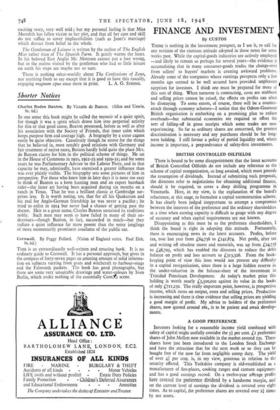Shorter Notices IN one sense this book might be called
the memoir of a quiet spirit, for though it was a spirit which drove him into perpetual activity for this or that good cause, Buxton possessed, before as well as after his association with the iociety of Friends, that inner calm which keeps purpose firm and courage high. A biography by a sister cannot easily be quite objective. Ceaselessly though he strove for the things that he believed in, most notably good relations with Germany and fair treatment of native races, Buxton hardly held quite the place Mrs. de Bunsen claims for him in the political scheme of things. He sat in the House of Commons in 1910, 1922-23 and 1929-31; and for some years he was Parliamentary Adviser to the Labour Party, and in that capacity he may, admittedly, have exercised a greater influence than was ever plainly visible. The biography sets some pictures of him in perspective. For those who knew him in later days it is none too easy to think of Buxton as a keen hunting man and an expert bareback rider—the latter art having been acquired during six months on a ranch in Texas. That he was a brilliant classic at Cambridge sur- prises less. It is worth noting, too, that for all his Quakerism and his zeal for Anglo-German friendship he was never a pacifist ; he tried to enlist in 1914 but never had a chance of getting past the doctor. Heir to a great name, Charles Buxton sustained its traditions nobly. Such men may seem to have failed in many of their en- deavours—though Buxton, in fact, succeeded in much—but they radiate a quiet influence far more potent than the noisy janglings of more momentarily prominent assailants of the public ear.


































 Previous page
Previous page